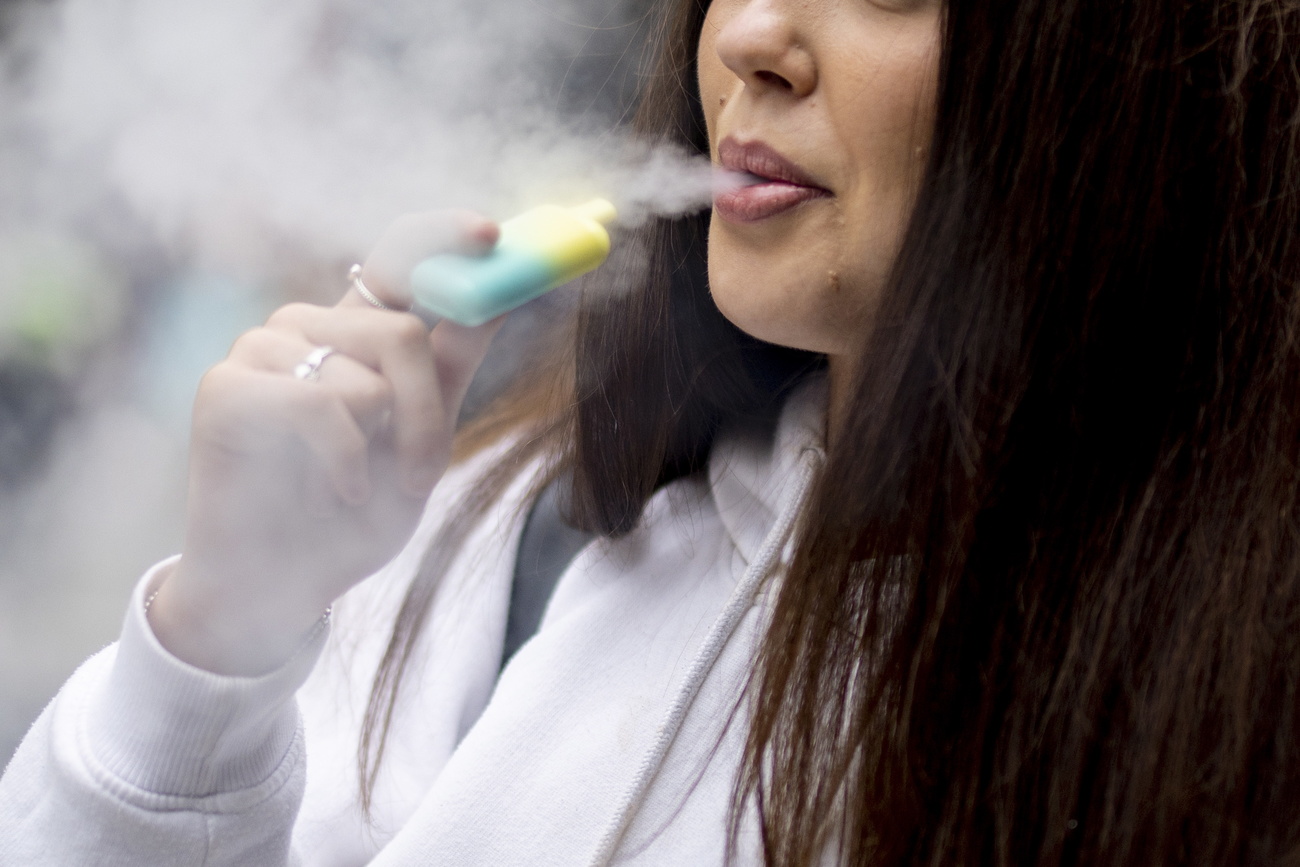Swiss addiction experts alarmed by rise in young smokers

The NGO Addiction Switzerland has called for tighter measures to protect young people after identifying an increase in the consumption of nicotine and online gambling problems.
The number of online gamblers with problematic behaviours appears to have doubled within three years, the NGO said in its ‘Swiss Addiction Panorama 2024’ annual report published on Thursday. The non-profit foundation said that most of those affected were young men and that the average debt was around CHF88,000 ($99,270).
Video games and social media aren’t without risk, with around 3% of 15-year-olds exhibiting problematic behaviours when playing video games, and at least 7% of 15-year-olds when on social media.
+ Around 3% of Swiss teens are addicted to video games
The foundation has called for regulatory measures and for politicians to provide better protection for young people. It also said that media literacy should be promoted among children, young people and adults, along with early recognition of problematic behaviours.
More snus and e-cigarettes
Addiction Switzerland is also alarmed by an increase in cigarette consumption among 13-year-olds, with 6% of them having smoked at least once in the month prior to the survey – double the figure recorded in 2018.
The consumption of nicotine products among young people has increased overall, with around a third of 15-year-olds having consumed at least one nicotine product at the time of the survey. The foundation said this was due to the emergence of snus products and ‘puff bar’-style disposable e-cigarettes. Consumption of the latter had increased among girls in particular.
+ Could Switzerland follow the UK and ban disposable vapes?
At the same time, the consumption of conventional cigarettes has not decreased among young people, while among adults, a slight decline in cigarette consumption was offset by other nicotine products.
More binge drinkers
The proportion of people who drink alcohol every day has fallen by around half since 1992. However, 11% of women and 19% of men get drunk at least once a month, according to the report.
Around a quarter of 15-year-olds had consumed five or more alcoholic drinks on one occasion in the 30 days prior to the survey, while the figure for 13-year-olds was 17%. The foundation has therefore called for the ban on sales to young people, particularly on night-time sales, to be enforced consistently, for prices to be increased, and advertising to be restricted.
Mixing prescription drugs
The use of prescription drugs and mixing different medicines is widespread among young people: 12% of 15-year-olds have already experienced this. The foundation said that preventative action also needed to be stepped up in this area.
The sale of potentially addictive sleeping pills and tranquillisers has plateaued at a high level, with a slight decline in the sale of opioid painkillers, the report said.
+ High times in Basel: Swiss city experiments with recreational cannabis
Less cannabis but more cocaine use
Cannabis usage, meanwhile, has remained stable overall and has declined among 15-year-olds: 12.1% of boys and 8.4% of girls had used cannabis in the month prior to the survey. Less than 1% of schoolchildren used cannabis ten or more days a month.
However, the reasons for the increasing use of cocaine, especially in the form of smokable crack and freebase, was difficult for the foundation to determine, with several factors to consider, for example lower prices and new consumer groups.
Adapted from German by DeepL/kp/sb
This news story has been written and carefully fact-checked by an external editorial team. At SWI swissinfo.ch we select the most relevant news for an international audience and use automatic translation tools such as DeepL to translate it into English. Providing you with automatically translated news gives us the time to write more in-depth articles.
If you want to know more about how we work, have a look here, and if you have feedback on this news story please write to english@swissinfo.ch.

In compliance with the JTI standards
More: SWI swissinfo.ch certified by the Journalism Trust Initiative






















You can find an overview of ongoing debates with our journalists here . Please join us!
If you want to start a conversation about a topic raised in this article or want to report factual errors, email us at english@swissinfo.ch.